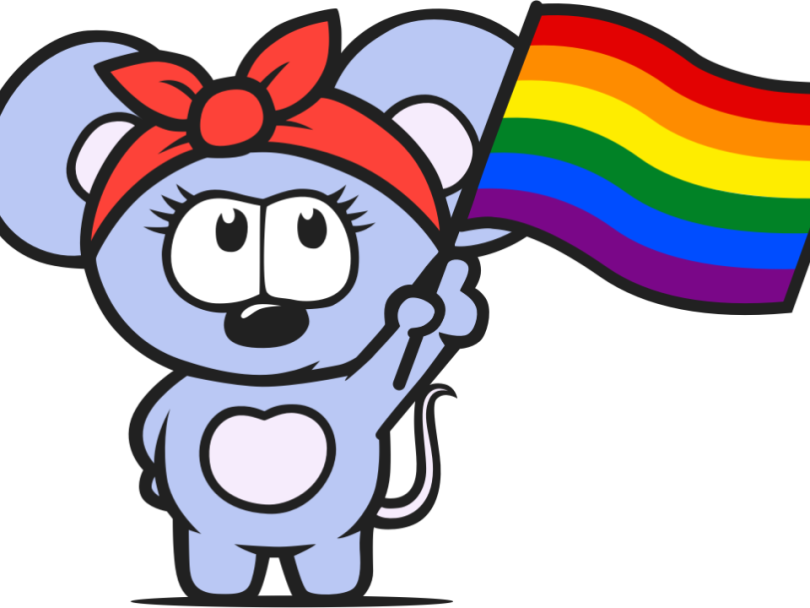The first place Andrea Breanna felt like she could be herself was online.
She was raised as a boy by a Mexican mother and an American father in Mexico before the family moved to Palo Alto, California. Her name was Paul Berry then, but she identified as a Mexicana girl. It was only on early-internet chat rooms like CompuServe that she could embrace that identity, giving herself the name Andrea.

Those experiences inspired her to pursue a career in tech, and she eventually became CTO of The Huffington Post. In 2012, she launched her own company, RebelMouse: a CMS platform and creative agency that helps media brands reach wider audiences. But Breanna continued presenting as a man in the office and at home, where she was married and had three kids.
“I was terrified to come out,” Breanna said. “My wife was pregnant with the fourth kid, and I loved them so much that the fear of losing them was the number one thing that kept me in the closet. The fear of everything keeps you in the closet.”
One of the things that kept me in the closet was that there were no narratives for me.”
But three years ago, RebelMouse faced a financial crossroads and needed a change. It was then that Breanna decided to stop running the business like a traditional venture-backed SaaS firm and do it her own way. That meant ditching the office, eliminating the sales team and going to a fully distributed workforce, with employees scattered across 26 countries.
That year brought a number of changes for the better. The business began to thrive, and the culture more closely resembled what she had set out to build, with a diverse staff that’s 70 percent women and 25 percent LGBT. It also played an important role in her decision to come out as trans.
Those experiences have shaped the work Breanna does at RebelMouse. She’s used her platform to promote LGBTQ+ awareness on social media and launched a blog about gender fluidity titled Fluidity.love, to expand the narrative around the trans community.
As the tech industry undergoes a reckoning for its lack of diversity and inclusion, Breanna said, it is more important than ever for CEOs to think about the influence they have on society. In many ways, the social media platforms where Breanna once felt at home have begun to shut people like her out because LGBTQ+ is an afterthought, both when it comes to user policies and algorithm design. Her own Twitter account was banned at one point because of the transphobic comments it attracted. (It has since been reinstated.)
Breanna continues to use her platform at RebelMouse and role as a tech leader to support the LGBTQ+ community. We spoke with her to learn more about those efforts and the responsibility tech leaders have to do social good:

When you launched Fluidity.love two years ago, what impact did you want the blog to have?
One of the things that kept me in the closet was that there were no narratives for me, and lot of us who are transgender wish we could go to our 13-year-old-selves and whisper one thing. For me, it’s that you can be a girl with a girl.
Another hard part is that society sees trans people as hideous, thanks to movies like Mrs. Doubtfire and Tyler Perry’s Madea. The idea that people could be attracted to who I actually am instead of who I’m pretending to be is totally missing. So, Fluidity.love is an attempt to fill those narratives.
The idea that people could be attracted to who I actually am instead of who I’m pretending to be is totally missing. So, Fluidity.love is an attempt to fill those narratives.”
How do you view that impact so far?
I’m proud of the work we’ve done and continue to do. We’re writing stories nobody else is writing. The only coverage of nonbinary or trans people is if they live in London, New York or San Francisco and they’re fit for Prada and Gucci, or they’re a singer. That’s it. This is not something that just happens as a Prada fashion trend, and it’s not only gorgeous trans models. It’s happening in every town, city and country, and our hope is to fill those narratives.
While we don't get 10 million unique visitors a month, we get beautiful messages for our work. Trans women and men have been able to come out to their partners and stay with their partners. We’ve received messages from readers sharing their stories of how they came out, and that their husbands or wives stayed with them.

Where do you think your work in tech can have the biggest influence on the LGBTQ+ community?
I actually think it’s RebelMouse’s role that I care most about, and it’s that you can be out of the closet as a trans person. The only narrative is that we are going to commit suicide. It’s depressing. So that’s our real obligation now. Maybe through our work with RebelMouse and our meetings with Facebook, someone will write a pro-trans algorithm. We have amazing media partners like Paper Magazine and Nylon. We might do more with them in a partnership where we can put all of these premium LGBTQ+ media parties together and show Facebook the work they’re doing. Because these stories should go way more viral than they do.
What responsibility do tech companies have to actively do social good?
If you have a big platform, then the responsibilities are a hundred times more important than everyone else’s. We aren’t Twitter, Facebook or Google, but I do feel that with 50 million unique visitors, it matters what you say and the messages you’re spreading. As the owner of a platform, you have to have a spine. When you violate terms of use, that’s it for you. Enforcement of terms of services is the moral obligation that CEOs and major platforms are missing.
It's best for us to see ourselves as how our kids tell the story of who you are, and not how will the board think of you?”
I have strong feelings of obligation that as the owners of platforms, we need to deliver a greater good. That has to be our realm instead of just the profit motive. I understand that there’s a lot of companies that struggle to survive — and we’ve had times at RebelMouse where we’ve struggled to survive — but the goal should be to deliver social good. It’s best for us to see ourselves as how our kids tell the story of who you are, and not how will the board think of you?
What role do tech companies have in promoting LGBTQ+ inclusivity in the workplace?
At one point, we were trying to provide training for corporations on trans issues, but doing business as a trans person on trans issues was really hard and alienating. People took meetings just because they wanted to educate themselves, but they never had any budget for our training. We had one head of HR, who came back to us and said, “We found out that we haven’t done anything on gay or lesbian issues. So we can’t do this until we do that.” They were unabashedly saying: “You are the last letter in LGBT, and the last priority.”
There are so many people who are terrified and in the closet, not knowing if their workplaces will be supportive of them. I have thousands of friends on Twitter who are super depressed because come Monday, they have to go into “boy mode.” They’re worried about losing their jobs. So, unfortunately, diversity and inclusion efforts are often mostly just lip service and don’t reflect reality.
What should tech leaders be doing to promote more inclusive workspaces?
My intention at RebelMouse isn’t that we explicitly employ only trans and non-binary people. I’m proud that we do, and that we’re working on it a lot, but we’re not going to be like a Walmart with 500,000 employees. So the world needs to change. The number one thing a CEO can do is be explicitly pro-LGBTQ+. It’s hard to explain how much it relieves the fear. It can be making your avatar the Pride Flag during pride month. It can be sharing the right articles with your team. If the CEO is a straight, white male in particular, being explicitly supportive of the LGBTQ+ community can mean a lot.
More than ever, people who are LGBTQ+ are scared for their careers, for their livelihoods. An implicit ally is not nearly as helpful as an explicit ally. Another small thing, putting your pronouns in your bio is a smart and nice thing to do. Doing a little training — there are so many people who offer it. You don’t have to wait until the first trans person comes out of the closet. You don’t know how many people you know who are trans. Those are all low-cost, low-energy things that can change people’s lives.
The number one thing a CEO can do is be explicitly pro-LGBTQ+. It’s hard to explain how much it relieves the fear.”
How can major social media platforms work to become more inclusive?
We obsessively understand Google and Facebook’s algorithms. We have clients we help reach 50 million people a month. Facebook and Google do not have anti-LGBTQ+ algorithms, and they don’t have an anti-trans algo in particular, but they end up being anti-LGBTQ+ because of how society reacts to us.
If you put out in the public something like Sam Smith announcing they’re non-binary, the comments are different from when Ariana releases her new album. What Facebook is trying to do is to not have controversial stuff. So as soon as a few people make false reports flagging it as hateful to Facebook, Facebook’s algorithm assumes it’s terrible, and it’s gone.
Facebook and Google do not have anti-LGBTQ+ algorithms, and they don’t have an anti-trans algo in particular, but they end up being anti-LGBTQ+ because of how society reacts to us.”
How does that end up affecting the trans community on social media?
People have strong reactions to LGBTQ+ people as a whole. Anti-trans people will report content for copyright violations, hatred and abuse, even if it’s not true, en masse. It ends up dampening the virality of the content. As a result, every trans person’s account gets blocked at some point.
My Twitter account was blocked, but it was reinstated quickly. If you try to fight with me on Twitter, I just block you. However, trans people will get blocked just for defending themselves. Those arguments can get emotional, and soon enough, their accounts will get blocked because of a statement they made. I’m part of a group where people exchange contact information so that, when they go dark, they can be found.
What impact does that have on LGBTQ+ content and voices?
It means that it would be extremely hard for Fluidity.love to be the next big viral media sensation. Facebook just hasn’t been inclusive enough to write algorithms that can help LGBTQ+ issues and that can help diversity and protect us all from bigotry and hatred and let the good content reach the people.
This interview has been edited for length and clarity.




